|
We arrived in Charleston a day before our cruise.
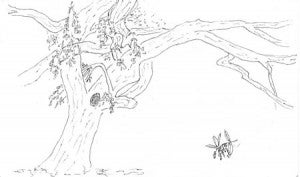
Southern Live Oak in Cannon Park
|
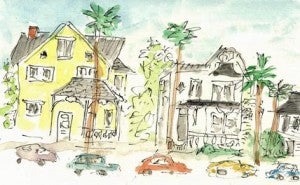
There were many beautiful old homes in the downtown historic district.
|
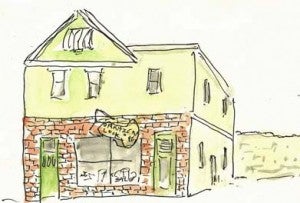
Jantzen’s Lock & Key
|
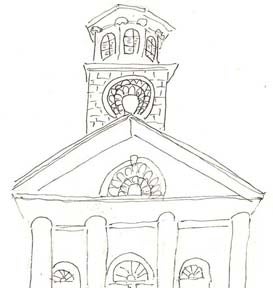
2nd Presbyterian church
|
|
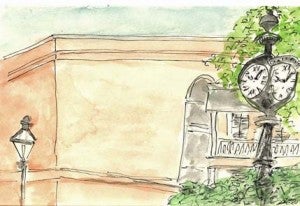
The College of Charleston is a lovely public university located in the heart of the city.
|
 |

Spanish moss (an epiphyte) is everywhere.
|
|
|
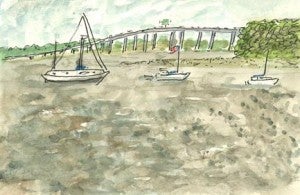
Charleston harbor
|
We sailed on the S. S. Independence, a small US-built cruise ship (74 passengers) through a section of the country that we knew little about. Our trip started in Charleston, South Carolina, and ended on Amelia Island in Florida.
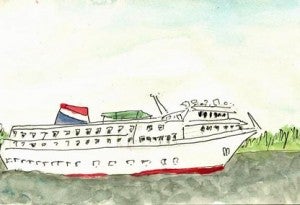
S. S. Independence
|
|
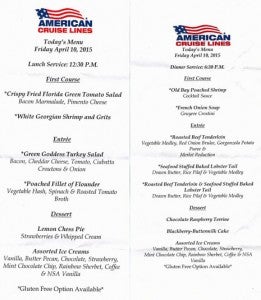
Click menu to enlarge |
We traveled in shallow waterways through low country with little elevation to the landscape, other than the occasional sand dune. Tidal marsh, mostly Spartina grass, covered both sides of the channel.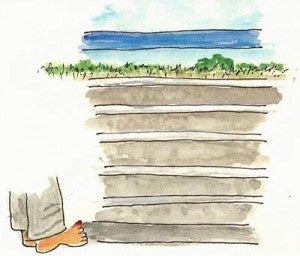
View through stateroom railing, including Barbara’s toes |
|
|
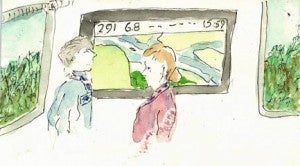
GPS in ship’s lounge showing real-time route
|
In the past the freshwater marsh was used for cultivating rice, a crop requiring extensive labor, hence the dependence on slavery and the plantation system that dominated this area. Other important crops were indigo (before the revolutionary war) and later, sea island cotton, a long-fiber cotton of great value.
First stop after Charleston was Beaufort, SC — that’s “Beau” as in “beautiful” not “Bow” as in Beaufort NC. Seems a good way to keep them straight. We don’t know how they deal with Charleston in both states.
|
|
From Beaufort we visited Gullah (perhaps a corruption of Angola) communities, and learned about the history of Penn School, the first school for slaves in the Deep South. We heard much about the Civil War, or as the locals pronounced it, “The Woewah” (2 syllables).
We visited a slave and descendants cemetery (where all were buried facing east toward home in Africa). Miss Eveline told us about the local culture and sang (she has a beautiful singing voice) in a very small old prayer house.
Beaufort is a lovely small city on the water with comfortable homes and more of the ubiquitous live oak and Spanish moss.
|
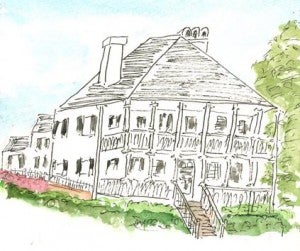 |
|
|
Beaufort home
|
Our next shore stop was Hilton Head island. We rented coaster bikes (took some getting used to) and rode through Sea Pines, a planned development with abundant wildlife. There were a jillion families on the bike paths (still spring-break season).
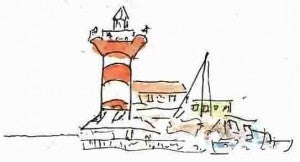
Harbor Village lighthouse, Hilton Head
|
|
|
Ate lunch at the Crazy Crab restaurant (the one-toothed crab is a fabric sculpture)
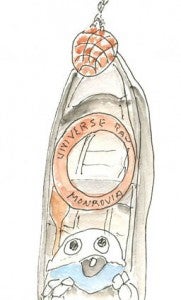
|
Savannah is a jumping place — lots of harbor activity
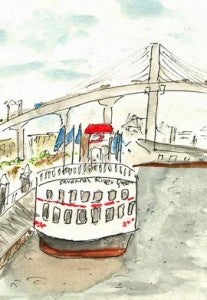
Savannah River Queen at dock
|
|
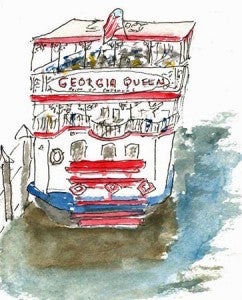
Georgia Queen river boat
|
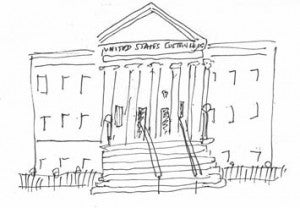
We skipped the Trolley Tour and walked around to see the sights. Savannah is a beautiful city, laid out by James Oglethorpe around 23 green squares with fountains and statuary.
|
|
|
Wright’s Square, Savannah |
Chippewa Square, Oglethorpe statue and lamppost
|
|
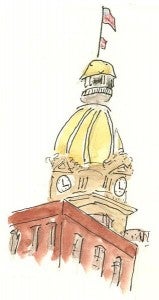 Savannah City Hall with gold leaf dome Savannah City Hall with gold leaf dome |
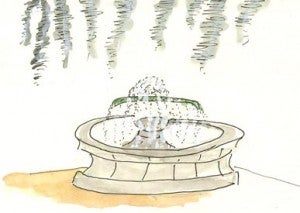
Fountain in Orleans Square, Savannah
We learned how Savannah was saved by the “great skedaddle.” The slave holders fled leaving everything behind (they expected to return within a few weeks). The Confederate general surrendered to save the city from being torched. Sherman presented Savannah as a present to Lincoln.
After Savannah, we docked in Brunswick. We took the boat’s launch to Sapelo Island. There are many, many islands in the area — sea islands inland and barrier islands along the ocean. There is no bridge to Sapelo. Many of the people living there are direct descendents of former slaves.
|
|
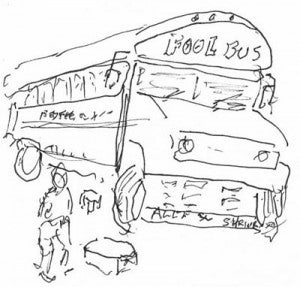
Bus used for touring Sapelo Island
|
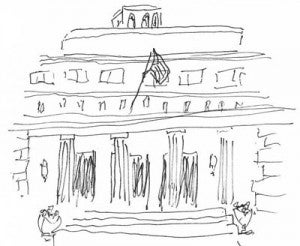
Reynolds mansion
Sapelo was once owned by R. J. Reynolds and the mansion is available for rental — weddings, conferences, etc.
|
|
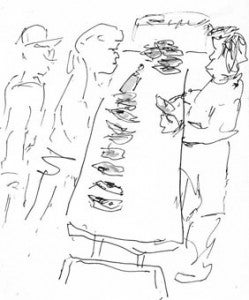
Sampling steamed oysters at the Hog Hammock Community
|
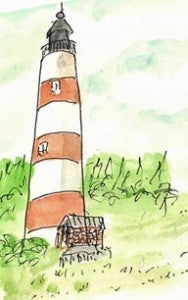
Sapelo Island Light Station, 1820
|
|
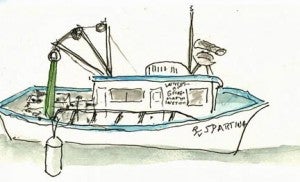 Boat used by the University of Georgia Marine Institute Boat used by the University of Georgia Marine Institute
This part of the coast is the Georgia Bight and it generally is protected from hurricanes.
|
We passed on visiting the mansions of Jekyll Island and seeing St. Simons Instead, we explored Brunswick. It had once been a thriving city with a lumber and ship building industry. But now many of the shops were shuttered and the downtown area was dead. The homes were nice and the downtown and waterfront areas were well-maintained. It was sad to see.
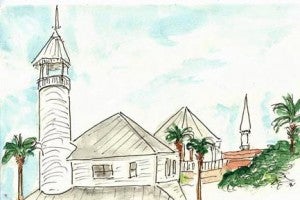
Empty visitor center building
|
|
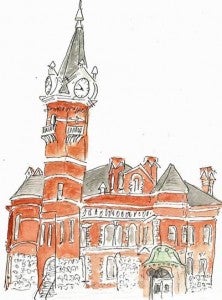
Old city hall, Brunswick
|

Lanier Bridge
|
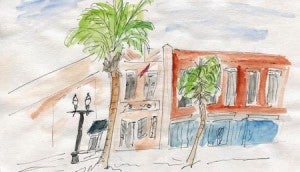
Boarded storefronts
|
|
|
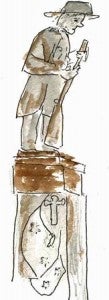
Memorial honoring Confederate soldiers
|
 |
Hanover Square, Brunswick |
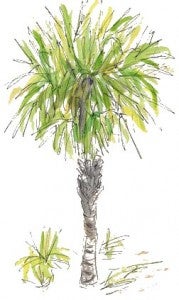
Like Savannah, Brunswick was laid out on a grid with many green squares
|
|
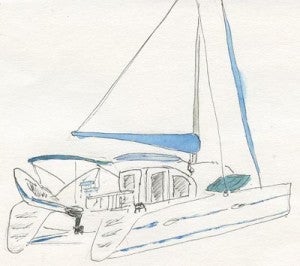
Catamaran
Despite the depressed economy, there was a marina with 16 docks housing pleasure boats, some expensive.
|
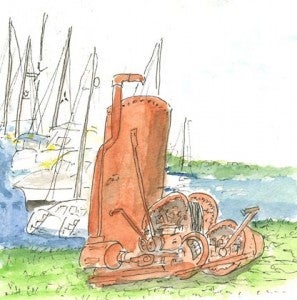
Old piece of machinery – maybe a hoist
|
|
Our cruise ended at Fernandina Beach, a historic town on Amelia Island, FL. We stayed an extra day exploring this beautiful town. Eight flags have flown over the island — France, Spain, England, the Patriots of Amelia Island, Mexico, United States, the Confederacy, and the Green Cross from a self-proclaimed ruler.
On the beaches of nearby Cumberland Island (home of a Carnegie mansion) people searched for sea shells and sharks teeth. There are wild horses on the island. The population stays constant as they are short-lived due to a grass diet high in salt.
|
|
|
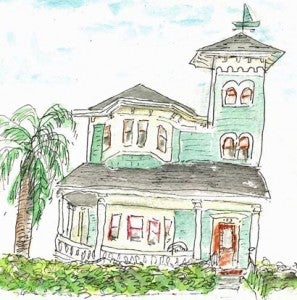
Fernandina home
We visited the Saturday Farmer’s Market and the Artrageous walk (open art galleries) that evening. The art was good and the locals very friendly.
|
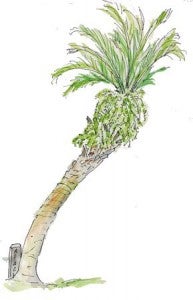
Palm tree with asparagus fern growing in it
|
|
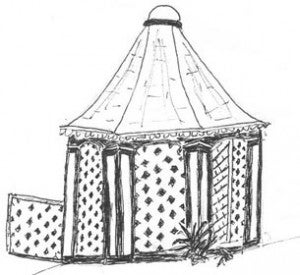
Gazebo at St. Michael’s Academy
|
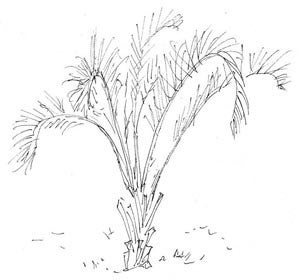
Ubiquitous palmetto
|
|
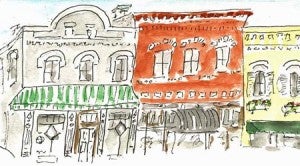 |
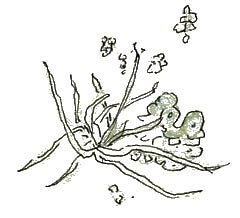
Tiny epiphyte and lichen
|
|
The food and service aboard the Independence were above expectation (with lots of seafood). Every day there was an afternoon cocktail hour, companionship, and an efficient and always enthusiastic staff. The talks and evening entertainment were of high quality. We had a great time.
Bob & Barbara Sommer
|
|